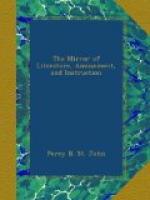The frauds and fooleries of the joint stock company mania are, perhaps, among the least successful portion of the volume. The “literature” is somewhat better, as the establishment of a “Society for the Diffusion of Fashionable Knowledge”—its first treatise, Nonchalance—dissertations “on leaving cards,” “cutting friends,” “on bores,” &c.—and a new novel called “Burlington”—the last a scratch at Popanilla’s publisher. The “Clubs” are next recommended for those fond of solitude, and their satin luxuries humorously quizzed; but “the Colonial System,” which follows, has more causticity. Popanilla, like all other great foreigners who visit England, falls ill; his disorder is “unquestionably nervous;” he is to count five between each word he utters, never ask questions, and avoid society, and only dine out once a day. This regimen brings on a slow fever; but his disorder is neither “liver,” nor “nervous,” but “mind.” He next falls in with an Essay on Fruit, from which he learns that thousands of the Vraibleusians are dying with dyspepsia from eating pine-apples, which are denounced as “stupid, sour, and vulgar.”
Popanilla is ordered by his physician to Blunderland, where the women are “angelic,” and the men “the most light-hearted, merry, obliging, entertaining fellows;” and where “instead of knives and forks being laid for the guests at dinner, the plates are flanked by daggers and pistols.” A “row” springs up; “all the guests lay lifeless about the room;” “Popanilla rang the bell, and the waiters swept away the dead bodies, and brought him a roasted potato for supper.” He next enjoys the pleasures of the chase, and in revenge for a sharp fire, “burns two villages, slays 2 or 300 head of women, and bags children without number;” and in the evening Popanilla’s powers of digestion are improved. He now returns to Vraibleusia, where all are panic-struck, and his friend, the banker, unlike his “perpetual ticket,” has stopped payment, and all our traveller’s resources. Popanilla consoles him with the joke that “things were not quite so bad as they appeared,” till they get worse, by two gentlemen in blue, with red waistcoats, arresting the ambassador for high treason. This completes his “amusements.” He fears “confined cells, overwhelming fetters, black bread, and green water, in the principal gaol in Hubbabub;” but becomes ensconced in Leigh Hunt’s “elegantly furnished apartment, with French sash-windows and a piano. Its lofty walls were entirely hung with a fanciful paper, representing a Tuscan vineyard; the ceiling was covered with sky and clouds; roses were in abundance; and the windows, though well secured, excited no jarring associations in the mind of the individual they illumined, protected as they were by polished bars of cut-steel.”




